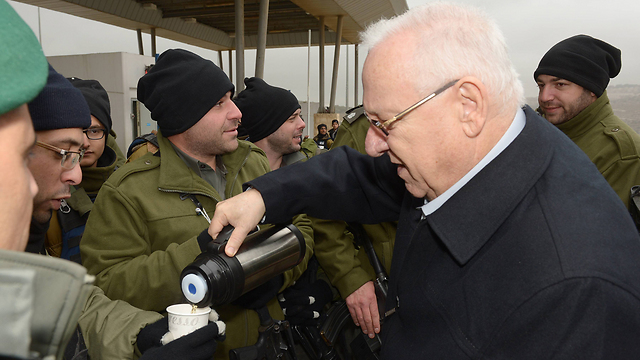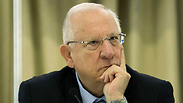
Coexistence and democracy are the themes that seem to be closest to the heart of President Reuven Rivlin, and the ones that crop up again and again in his meeting with a handful of English-language journalists in Israel in honor of Independence Day.
The 75-year-old president is welcoming, shaking each person by the hand before settling down for a frank and often boisterous conversation, in which the former Likud MK, minister and speaker of the Knesset lays out his worldview on a range of topics from Iran and the Palestinians, to Israel's Arab population and his own long career as a public servant.
Tackling the issues head on, Rivlin defines the two biggest challenges facing Israel today: Iran and the Palestinians. The former he brands a danger which "threatens us from far and near with their support for terror groups," and the latter as the "150-year-old tragedy in which we live", to which finding a solution is imperative.
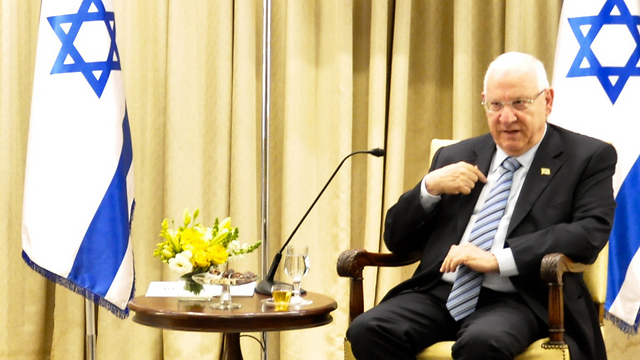
When it comes to the Palestinians, Rivlin has a message of coexistence, portraying the conflict over this narrow sliver of land as an opportunity: "We are destined, not doomed, to live together," he maintains, a message he says he has often repeated in the past.
"All sides must learn to respect one another. The Palestinians must understand that this is our home, to which we have returned, and we also have to understand that this is the homeland of all those born to it."
He paints an image of two nations whose resources and manpower can be channeled into prosperity and development, not war and loss. And perhaps surprisingly to some, given his past opposition to a Palestinian state, Rivlin's answer to the decades-old conflict is direct talks with the Palestinians, "to bring to an end the tragedy."
"There are many Palestinians who believe there is no way to recognize Israel as a Jewish state," he says. "They call for the right of the return of refugees to Israel - something which is unacceptable for the consensus in Israel and which strikes at the very heart of this issue.
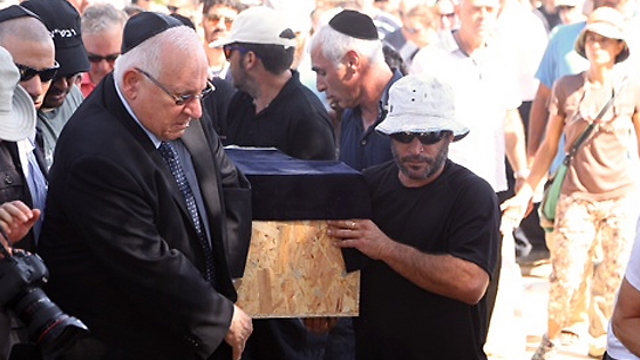
"So we have to find a way to live together, and I would like to meet and discuss these issues with the Palestinian leadership. There will never be peace unless we have open borders. But that does not mean, open on our side and you continue to hit me on the other. And the international community must take responsibility to ensure any agreement reached.
"On the one hand I am very idealistic, but on the other I know we have problems and we must learn to face them. As Herzl said, 'if you will it, it's no dream'."
The president warns that the explosive geography and history of the country is a breeding ground for extremists seeking to drag the region into a bloody conflict.
"We have no war with Islam," he says. "But the fundamentalists – on all sides – continue to fan the flames, and no flames are hotter than the volcano on which we sit, the Temple Mount."
Dangerous isolation
With regards to Iran, Rivlin identifies an alarming situation in which the world is seeking to reconcile with Iran and its nuclear ambitions, while simultaneously condemning Israel at the United Nations.
"The leaders of Iran, the ayatollahs, are trying to unite the whole Arab world against Israel by saying Israel is something that should be brought to an end," Rivlin says, pointing out that until the rise of the Islamic regime in Tehran, Israel and Iran were strong allies.
"Unfortunately, now the whole world thinks that we have to find a way to reach an understanding with the Iranians, how to live with the new situation in which the Iranians are on the threshold of nuclear weapons, and unfortunately we are a little isolated because of this attitude."
Rivlin is adamant that Israel is unable to deal with these challenges alone, and in the face of this international isolation, he highlights the crucial nature of strong support across the American political spectrum - perhaps a delicate nod to the furor over Benjamin Netanyahu's recent controversial speech to Congress.
"Israel does not, cannot, should not and must not face these challenges alone," he says. "Israel must not allow itself to be isolated. I have said many times the importance of Israel's relationship with the US. I believe in the importance of bipartisan support, and I know - having welcomed many such delegations - that we have many friends on both sides of the aisle."
Furthermore, he states, "The Americans are very important to the existence of Israel, to the future of Israel, and for being able to keep danger far away from us."
Democratic and Jewish
To the life-long public servant, who was born and lived most of his life in Jerusalem, democracy is at the root of the Israeli experience, and cannot survive without it."I was nine years old when I first saw the Israeli flag raised as the flag of a sovereign state," he recalls. "When I see the flag raised with Hatikva (the national anthem) playing, it is still very emotional for me. I know that this is not to be taken for granted.
"We have had to work to convince all those around us that Israel is a fact and here to stay. Just as we must work to understand that Israel is a democracy for all its citizens. There is no gap between being a Jewish and democratic state, which means it is a state all its citizens, and Jews, Christians, Muslims, must have the same rights, and same responsibilities."
He insists that, "The Jewish people have no other state to live in. And at the same time, I cannot live in a Jewish state without it being democratic."
Rivlin also shares a small laugh at the expense of Avigdor Lieberman, who insisted on raising the threshold for a party's entry to the Knesset, in what critics called a less than transparent effort to reduce the number of Arab parliamentarians.
"While some Jews in the Knesset thought that raising the threshold in the last elections might get rid of the Arab parties, the decision wound up unifying the Arab parties," the president says. "It turns out that the only people in the world who can unify Arab politicians are the Jews."
He is equally certain that there is a place for the Arab population in Israel, and laments the rift between Jews and Arabs.
"For the Arab citizens of Israel, many do have an internal conflict of loyalty between their state, and their wider people. They often ask themselves 'are we part of Israel, or are we not part of Israel?' Indeed, it is difficult these days, with such tensions between communities. There are many who are scaremongering about a threat that is posed by the Arab population, that they threaten somehow Israel's democracy, or that Israel may lose its Jewish majority.
Rivlin sounds a note of hope, highlighting the senior roles held by Israeli Arabs and recounting with pride his time in the cabinet alongside the first Arab to be appointed as minister.
"Salim Joubran, an Arab judge, ran the last elections, and made crucial decisions. I am very proud of that as a democrat and very proud as a Jew," the president says. "Building confidence between the two communities will take time," he concedes. But, he adds, "we are on the right track."
Rivlin sought the presidency in 2007, when a country reeling from the resignation and subsequent imprisonment of incumbent Moshe Katsav for a string of sex crimes selected Shimon Peres, himself the loser in a previous race against Katsav.
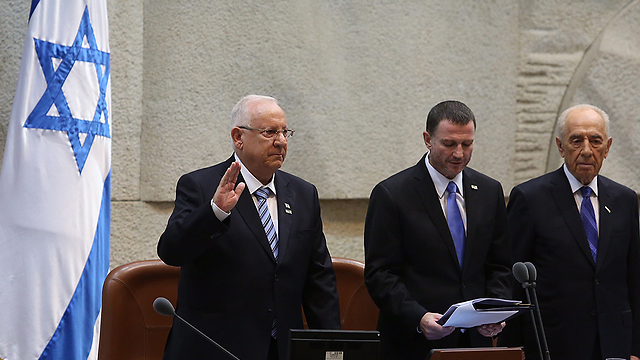
Rivlin pays tribute to Peres, whom he calls a friend and a mentor, but is quick to highlight the differences in style between their respective presidencies.
"Having been elected as president, I thought to myself that it would be quite dull, yet I have not had one such moment. As president you are facing everything that the people are facing; everyone can get in touch with the president's office and when there is a point to be raised, we can discuss it to see where the solution may lie."
In a concluding message to the nation, Rivlin strikes a suitably patriotic tone: "People of Israel, be proud of the flag. Don’t take this country for granted. We have to appreciate our ability to live in the independent state of the Jewish people."
Reuven Rivlin isn't an aged warrior turned statesman like the Israeli leaders of yore, nor is he a charming polyglot and sensation on the international stage. He's not tall, booming or imposing - he's warm, conciliatory and grandfatherly. But perhaps, in the riven and war-shaken Israel of 2015, he's the president Israel needs.














